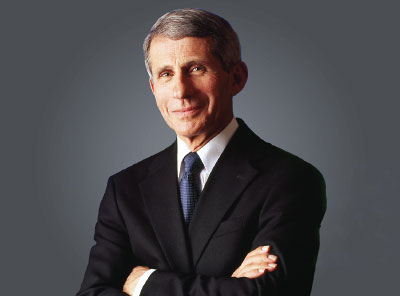Anthony Fauci, M.D., to Deliver Menninger Memorial Lecture
Abstract
The emphasis in COVID-19 testing technology is now on developing assays that can be widely used for testing asymptomatic individuals in schools, businesses, and individuals.
Anthony Fauci, M.D., director of the National Institute of Allergy and Infectious Diseases (NIAID), will deliver the 2021 William C. Menninger Memorial Convocation Lecture at this year’s Annual Meeting.

While some distrusted the Trump administration’s messaging on COVID-19, Anthony Fauci, M.D., was widely regarded as a trusted source of information.
At NIAID, Fauci oversees an extensive research portfolio focused on infectious and immune-mediated diseases. As the long-time chief of the NIAID Laboratory of Immunoregulation, he has made numerous seminal contributions in basic and clinical research; he is regarded as one of the world’s most-cited biomedical scientists. He was one of the principal architects of the President’s Emergency Plan for AIDS Relief (PEPFAR), a program that has saved millions of lives throughout the developing world.
Recently, he has been the most public face of the White House Coronavirus Task Force, advocating for social distancing, use of personal protective equipment, and other measures to slow the spread of the COVID-19 virus. He has spoken at multiple meetings of medical specialty organizations. At the meeting of the Academy of Consultation-Liaison Psychiatry (ACLP) last fall, Fauci outlined the public-private effort led by the National Institutes of Health (NIH) involving six pharmaceutical companies pursuing several different strategies but with common primary and secondary endpoints, shared databases, and common safety monitoring protocols overseen by NIH.
The six companies are Novavax, AstraZeneca, Johnson and Johnson, Sanofi/GlaxoSmithKline, Moderna, and Pfizer/BioNTech. Since that time, the Moderna and Pfizer vaccines have been approved by the Food and Drug Administration.
At the ACLP meeting, Fauci cited the “profound disparities” in illness related to COVID-19 among African Americans and Latinos, due in part, he said, to the higher prevalence of comorbidities in these populations and the likelihood that the jobs held by these individuals require them to be exposed to more people.
He also referenced the spike in mental illness, including substance use and suicidal ideation, “associated with extreme restrictions during lockdowns.” He added, “Medical workers themselves are experiencing a mental health crisis because of the strain of taking care of so many desperately ill individuals” (see Psychiatric News).
Fauci spoke with the editors of the New England Journal of Medicine on January 28 and discussed innovations in COVID-19 testing, distribution of vaccines, and the hesitancy of some groups of people to receive the vaccine, among other issues.
Fauci told the editors that the emphasis in COVID-19 testing has moved beyond testing individuals symptomatic for the illness to developing tests to be used by schools, businesses, and individuals for testing asymptomatic people.
“What has evolved now as we understand [the spread of the virus] better is that the outbreak is driven by people who are without symptoms,” Fauci said. “What we are seeing now going forward is getting highly specific point-of-care assays that can be used by virtually anyone anywhere on a personal basis. That is, [we are] getting away from only testing people who need a test. Now it’s anyone who wants one can get a test.”
Fauci said it was crucial to acknowledge that minority communities have historically valid reasons for being distrustful of government and medical institutions, but it is equally important to directly address those concerns as they relate to the COVID-19 vaccines.
Much reluctance centers around the haste with which the vaccines were developed. He emphasized that enormous progress in the science of vaccines and in understanding biologically similar pathogens had preceded the emergence of COVID-19 by decades and helped lay the groundwork for Project Warp Speed. “The speed [of vaccine development] is not related to cutting corners but is a reflection of the extraordinary advances in vaccine platform technology that allowed us to do things in months as opposed to years,” Fauci said.
Addressing the emergence of virus variants, Fauci said the single-dose vaccine being developed by Johnson and Johnson (Janssen Pharmaceuticals) is being tested in the United States, where variants have not yet become prolific, and in South Africa and Brazil, where the variants have spread with speed. This will offer a crucial comparison to determine how well the vaccine protects against COVID-19 variants.
“It has implications for the developing world,” he said. “A lot of people are looking very closely at what happens.” ■
The Convocation of Distinguished Fellows will be held Sunday, May 2, from 10 a.m. to 11 a.m.



